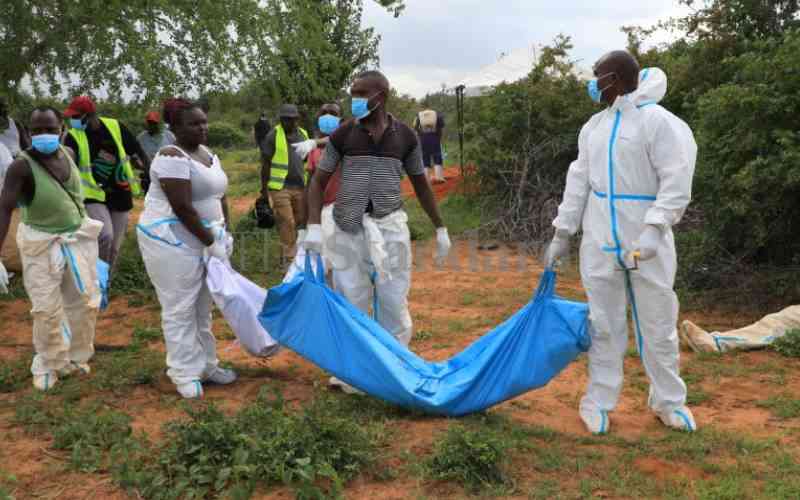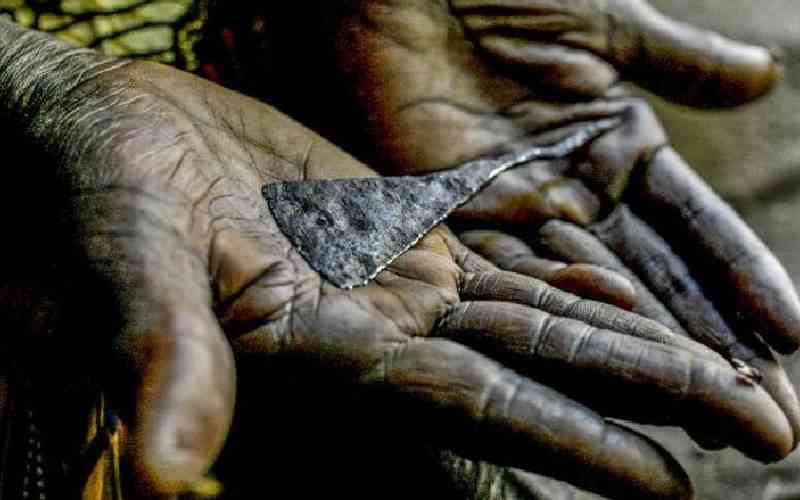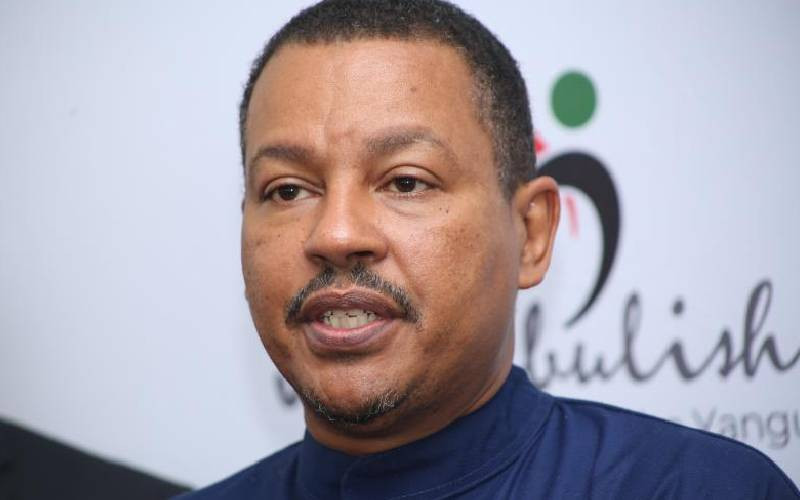BY PATRICK MATHANGANI
Kenya: Waweru Theuri’s son was barely a year old when he died at a concentration camp in Githiru village, about seven kilometres from Nyeri town.
It was at the height of the State of Emergency, declared by the colonial government in 1952 to crush the Mau Mau rebellion.
“It was a dreadful period, cries of children all over,” Theuri recalls. One day, his child fell ill, but loyalists guarding the camp would not allow his wife to take him to a nearby dispensary. Hours later, he was horrified to learn that the boy died in his mother’s arms as she sat with hundreds of other villagers. He says the thought that loyalists who left the child to die were fellow villagers well known to him deeply disturbs him up to this day.
Now, research has shown that 50 years since Independence, many people still bear mental scars of brutality in the form of a condition known as Post Traumatic Stress Disorder (PTST). The disorder is a form of mental illness that occurs when one goes through a horrifying experience.
Many Mau Mau veterans and ordinary villagers went through much worse experiences than Theuri, who was detained in several centres in Nairobi, Central and Nyanza areas.
A study titled Post Traumatic Stress Disorder Among Mau Mau Concentration Camp Survivors in Kenya found that 65.7 per cent of the 181 survivors sampled had PTSD.
“Similar to other former Prisoners of War elsewhere, these survivors suffer high PTSD prevalence rates and a special veterans’ service is recommended to address this problem and its associated factors among these and other veterans in Kenya,” says the study conducted by renowned psychiatrist, Dr Lukoye Atwoli.
The disorder was associated with older age, low income, long periods of detention, incarceration in more than one camp, and a history of mental illness in their families.
During the liberation struggle, many people were killed, dehumanised, brutalised and had property such as land seized.
The British government has indicated it is willing to compensate Mau Mau fighters or people tortured by colonial authorities during the struggle for Independence. This follows a suit filed by Mau Mau veterans, which sought to push Britain to accept liability for torture and killings during the struggle.
Up to 5,200 Mau Mau are registered in the suit. However, it only involves people who underwent physical torture, and there is no consideration for veterans suffering mentally.
Paul Muite, one of the lawyers involved in gathering evidence and filing the case, said other forms of injury visited on people during the struggle would ultimately be considered.
“What we have achieved is an important milestone in a long process,” he said. “We are asking, beyond physical torture, what about psychological suffering, those who died in the forest, those detained and not necessarily tortured?”
Atwoli says lawyers for the veterans have sought him out over the research findings.
Stay informed. Subscribe to our newsletter
Recently declassified documents also confirm that colonial officials sanctioned “psychological warfare” against Mau Mau. The mental assault was aimed at breaking down suspects and forcing them to confess to being members of the freedom movement.
More than 50 years later, the effects of these traumatic events are still being felt by survivors, according to the study.
Official figures show about 11,000 Mau Mau, 100 Europeans and 2,000 loyalists were killed in the struggle for Independence.
However, recent research by Harvard’s Prof Caroline Elkins found that as many as 100,000 Mau Mau suspects could have been killed. Many more were forced into concentration camps in villages across Central Kenya, which were designed to contain them from joining the rebellion.
In her book, Britain’s Gulag – The Brutal End of the Empire in Kenya, Elkins says thousands were detained and taken through the “pipeline,” a brutal network of detention camps designed to break down the resistance. The “pipeline” sought to kill the will of the fighters, after which they would confess, undergo rehabilitation and be absorbed back in the community.
Dr Atwoli says those who undergo PTSD have experienced traumatic events, including severe injury, or have witnessed others being killed, injured or tortured. The reaction is usually shock, horror or a feeling of hopelessness.
Among symptoms of this disorder found in the freedom veterans are “re-experiencing” the traumatic event, as if it is happening all over again.
“You find that these people are very fearful and withdrawn. When you try to talk to them, they avoid you, as if you are one of the people who made them go through that pain,” said Dr Atwoli.
Victims are also easily startled or frightened, and avoid anything that may remind them of those dark days.
“They avoid discussing the event, or can become sick during anniversaries such as Madaraka Day which reminds them of the struggle,” added Dr Atwoli. “They avoid meeting people who were with them in detention”.
In one declassified letter detailing events at Bahati Resistance Movement Centre near Nakuru, an official says methods used in the psychological warfare included creating fear among detainees. For instance, officials started rumours about “occult powers that exist here and are practiced on their entry.”
Once a suspect was taken in, other inmates would be prodded to ridicule him. They would then surround him, “where the game of ridicule can then be played to its limit.”
Wrote the official, who is not named in the letter: “Such unsavoury pastimes such as spitting on (images of) Kenyatta can create the atmosphere of ridicule. Doubt and bewilderment is then paramount in the primitive minds.”
Among those sampled in the study, 34.3 per cent had sustained major injuries requiring hospitalisation at the time they were detained. Fifteen survivors said they had been treated before for mental illness, while 26 had a history of mental illness in the family.
One hundred and thirty-two of those interviewed had experienced PTSD at one point in the lifetime, while 119 had it at the time of the interview.
The illness was also higher among those who had been incarcerated in more than one camp. The “pipeline” consisted a network of detention facilities, where inmates were classified according to the level of radicalism. Some of those interviewed had been taken through at least nine centres, which were spread across the country.
Eighty-five had been to more than one camp, representing 71.4 per cent.
In what captures the neglect of the freedom heroes, 78.5 per cent of those sampled earned less than Sh30,000 a year. This translates to less than Sh2,500 per month.
Dr Atwoli said some lived in slums. The study was conducted in Central Kenya, the Rift Valley and Nairobi areas.
Care for victims of war and trauma are major issues in developed nations, where studies have indicated that victims of conflict experience mental disorders.
For example, high cases of violence and suicide have been found in US soldiers who returned home after World War II, and after the invasion of Iraq.
However, few studies have been carried out on the matter in Kenya. Torture methods used by colonial officials were brutal. In another letter, an official boasts of the brutal methods he used to kill a suspect.
Often, such beatings and killings were done as other suspects watched, and had a lasting psychological effect on survivors.
“Things got a little out of hand,” the official wrote. “By the time I cut his balls off he had no ears and his eyeball, the right one, I think, was hanging out of its socket. Too bad, he died before we got much out of him.”
Last week, survivors of concentration camps recalled the brutality of white government officials and loyalists enforcing the State of Emergency.
Anne Njoki, who was a girl aged about seven years, recalled her suffering at a concentration camp, then known as Bendera-ini in Gatitu village, near Nyeri Town.
Bendera is Kikuyu for “flag” and referred to the Union Jack, which was hoisted at the camp daily. Residents of the village were required to report at the camp before daybreak, and remain seated until 6 o’clock in the evening.
“They would knock our door to wake us up. It was made of iron sheets, so it made a lot of noise and woke all our neighbours,” recalls Njoki.
Children were starved as their parents were not allowed to look for food, and many died.
“In the evening, my mother would grind some rotten maize and fry it on a pan. She would then grind them and give us to eat,” she recalls.
The words of Prof Elkins best describe the attitude of colonial officials who brutalised Mau Mau suspects.
“The settler regarded the Mau Mau as filthy animals, barbarians, bloodthirsty and pigs,” Prof Elkins said while delivering a lecture at the University of Nairobi in 2005. Her research has greatly aided the reparations case.
Dr Atwoli said apart from monetary compensation, a veteran’s service should be established to care for the welfare of Mau Mau survivors, as well as Kenyan soldiers returning from war.
He said those pushing for compensation should ensure the healthcare of the victims is catered for. But to facilitate healing, some form of recognition and apology would also assist in healing.
Muite said the government should fund a study to establish how many people were killed, tortured, maimed, detained, arrested or abused in any other ways.
“Let their names be recognised in a roll of honour,” said Muite.
“It will be a source of pride for their children and grandchildren. When they see these names, they will know they come from a line of nationalists.”
 The Standard Group Plc is a
multi-media organization with investments in media platforms spanning newspaper
print operations, television, radio broadcasting, digital and online services. The
Standard Group is recognized as a leading multi-media house in Kenya with a key
influence in matters of national and international interest.
The Standard Group Plc is a
multi-media organization with investments in media platforms spanning newspaper
print operations, television, radio broadcasting, digital and online services. The
Standard Group is recognized as a leading multi-media house in Kenya with a key
influence in matters of national and international interest.
 The Standard Group Plc is a
multi-media organization with investments in media platforms spanning newspaper
print operations, television, radio broadcasting, digital and online services. The
Standard Group is recognized as a leading multi-media house in Kenya with a key
influence in matters of national and international interest.
The Standard Group Plc is a
multi-media organization with investments in media platforms spanning newspaper
print operations, television, radio broadcasting, digital and online services. The
Standard Group is recognized as a leading multi-media house in Kenya with a key
influence in matters of national and international interest.








